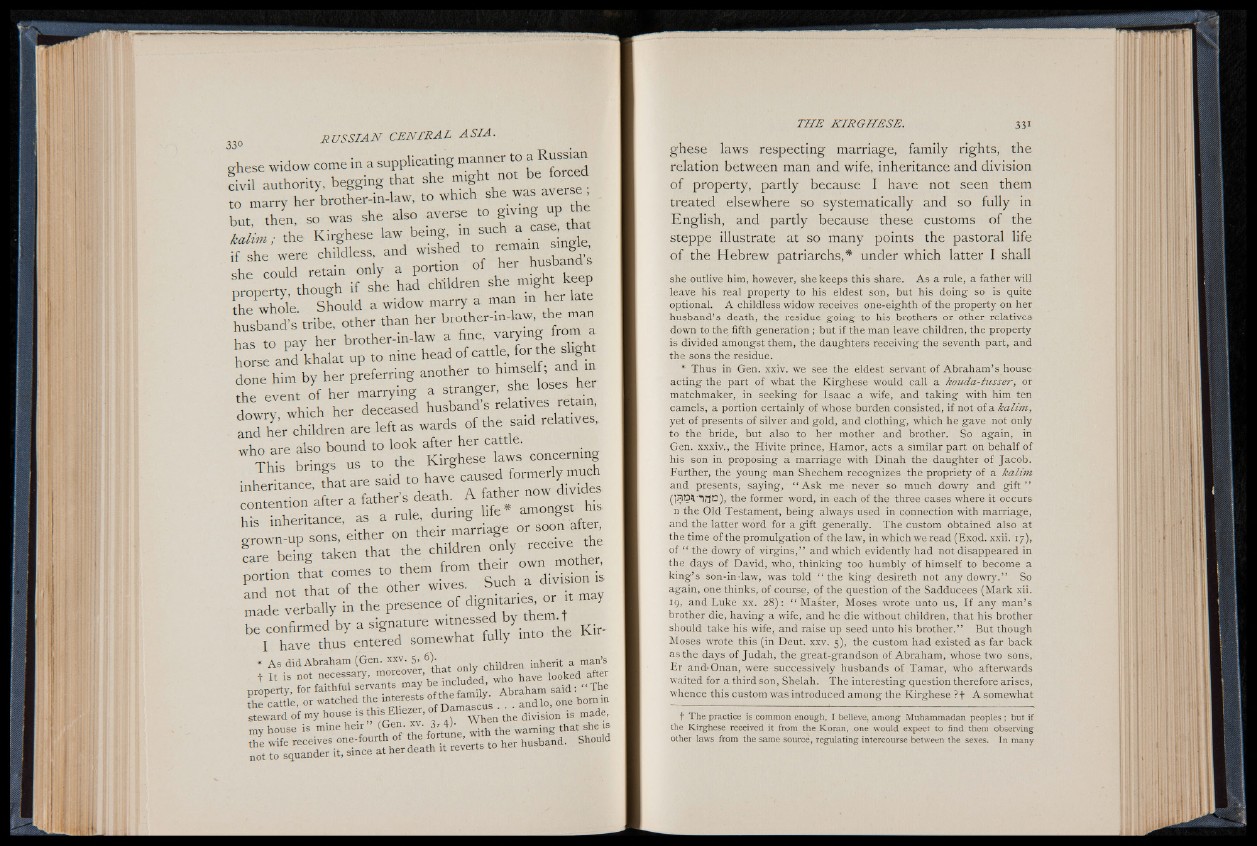
ghese widow come in a supplicating ■»£»<<* L ^ c e d
L a authority, begging that she
to marry her brother-in-law, to which she was averse ,
but, then, so was she also averse
k a l im ; the Kirghese law being, m s .
if she were childless, and wished to remain £> g■ ,
she could retain only a portion of her husband
property, though if she had children * e m.gh« keep
the whole Should a widow marry a man in her lat
husband s tribe, other than her brother-in-law, the man
has to pay her brother-in-law a fine, varying t V T i
horse and khalat up to nine head o f cattle, for t e ig
done him by her preferring another to
J even, of htn m a r ^
* M relatives- who are also bound to look after her cattle.
T h is brings us to the Kirghese laws concerning
• , • are said to have inheritance, that are said caused, formerlyd imviudcehs.
care ucu g tVipir own mother,
portion that comes to t em c . lct, a division is
m l nl b a f i y in t ^ ^ 1 ^ it may
* A s did Abraham (Gen. xxv- 5> 6)- dren inherit a man’s
t It is not necessary, m o r e o v e r that on y looked after
property, for faithful servants may-be included, <<The
the cattle, or watched the interests o ^ andlo> one bornm
steward of my house is this Eliezer, ^ the division is made,
my h o u s e is mine heir ( G e n . x v 3 4 h ^ that she is
ISliiSiillill Ih" s
ghese laws respecting marriage, family rights, the
relation between man and wife, inheritance and division
of property, partly because I have not seen them
treated elsewhere so systematically and so fully in
English, and partly because these customs of the
steppe illustrate at so many points the pastoral life
of the Hebrew patriarchs,* under which latter I shall
she outlive him, however, she keeps this share. As a rule, a father will
leave his real property to his eldest son, but his doing so is quite
optional. A childless widow receives one-eighth of the property on her
husband’ s death, the residue going to his brothers or other relatives
down to the fifth generation ; but if the man leave children, the property
is divided amongst them, the daughters receiving the seventh part, and
the sons the residue.
* Thus in Gen. xxiv. we see the eldest servant of Abraham’ s house
acting the part of what the Kirghese would call a kouda-tusser, or
matchmaker, in seeking for Isaac a wife, and taking with him ten
camels, a portion certainly of whose burden consisted, if not of a kalim,
yet of presents of silver and gold, and clothing, which he gave not only
to the bride, but also to her mother and brother. So again, in
Gen. xxxiv., the Hivite prince, Hamor, acts a similar part on behalf of
his son in proposing a marriage with Dinah the daughter of Jacob.
Further, the young man Shechem recognizes the propriety of a kalim
and presents, saying, “ A sk me never so much dowry and gift ”
(¡RDVhiJD), the former word, in-each of the three cases where it occurs
n the Old Testament, being always used in connection with marriage,
and the latter word for a gift generally. The custom obtained also at
the time of the promulgation of the law, in which we read (Exod. xxii. 17),
of “ the dowry of virgins,” and which evidently had not disappeared in
the days of David, who, thinking too humbly of himself to become a
king’ s son-in-law, was told “ the king desireth not any dowry.” So
again, one thinks, of course, of the question of the Sadducees (Mark xii.
19, and Luke xx. 28): “ Master, Moses wrote unto us, I f any man’ s
brother die, having a wife, and he die without children, that his brother
should take his wife5 and raise up seed unto his brother.” But though
Moses wrote this (in Deut. xxv. 5), the custom had existed as far back
as the days of Judah, the great-grandson of A braham, whose two sons,
Er and-Onan, were successively husbands of Tamar, who afterwards
waited for a third son, Shelah. The interesting question therefore arises,
whence this custom w as introduced among the Kirghese ? f A somewhat
f The practice is common enough, I believe, among Muhammadan peoples ; but if
the Kirghese received it from the Koran, one would expect to find them observing
other laws from the same source, regulating intercourse between the sexes. In many